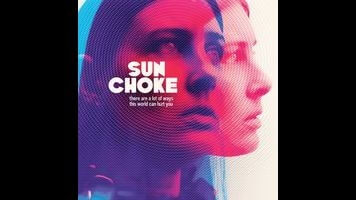Sarah Hagan has had two memorably substantial roles in her career thus far—both on television, and both over a decade ago. She was the rigorously prim mathlete Millie on Freaks And Geeks, and played Amanda, one of the “potentials” in the final season of Buffy The Vampire Slayer. Since the early 2000s, Hagan’s mostly been relegated to guest shots and bit parts, but that should change after her striking leading performance as the mentally disturbed Los Angeles heiress Janie in writer-director Ben Cresciman’s moody thriller Sun Choke. The film doesn’t always work as a genre exercise, but it’s a winner as a character study, in large part because of how committed Hagan is to playing Janie’s derangement. Casting directors in search of the offbeat should take note.
Hagan’s well-matched, too, by legendary “scream queen” Barbara Crampton, who plays Irma, Janie’s combination caretaker, psychologist, and wicked stepmother. In Sun Choke’s early scenes, Cresciman establishes the routine for Janie and Irma, which involves meditation, medication, and a kind of aversion therapy involving the painful sonic frequencies of a tuning fork. Then Irma decides that Janie has been well-behaved enough to attempt some unsupervised excursions, which is how Janie meets Savannah (played by Sara Malakul Lane), a young woman who looks a lot like her, and with whom she quickly becomes dangerously obsessed. The middle section of Sun Choke is an effectively creepy cycle of the heroine spending her free hours playing stalker/voyeur, and then coming home to her usual regimen of chemical and psychological torture at Irma’s hands.
Eventually, the movie moves in a more overtly violent direction, becoming more of a straight-up horror film—and unconvincingly so. Cresciman tries his hardest to avoid explaining too much: about what’s really wrong with Janie, about her well-to-do upbringing, about why Irma’s so intent on controlling her, or about what Savannah’s life was like before Janie started interfering in it. Sun Choke mainly traffics in archetypes. Cresciman explores the broader dynamics of doctor and patient and predator and prey, and ultimately leaves too many gaps in his movie to tell a full story.
But Cresciman does do a fine job of playing up his movie’s more sensational elements. He includes occasional flashbacks and dream sequences to underscore Janie’s psychosis, some of which are informative and some of which just seek to unsettle the audience with grotesque imagery, such as one shot of a fertilized bird egg smashing against a hard surface and exposing its embryo. Sun Choke also includes multiple scenes of nudity and explicit sexuality, suggesting an element of raw human desire to the characters’ various psychological manipulations. If the storytelling were just a little bit blunter, the film might actually have something provocative to say about sex, gender, sisterhood, and power.
Still, however oblique Sun Choke’s comments about need and privilege may be, its actors deliver the goods. Make no mistake: What Hagan, Crampton, and Lane are doing here isn’t subtle or nuanced. But they’ve all embraced the challenge of making something over-the-top and gothic. The best of the bunch is Hagan, whose tendency toward wide-eyed meekness makes her Janie all the scarier when she’s sneaking around inside Savannah’s apartment, or when she’s tormenting her crush-object while wearing improvised clown makeup. Hagan’s Janie is a monster like no other. It’s unlikely that enough people will see this performance to make it any kind of cult classic. But if the right people see it, then the actor should never want for work.

